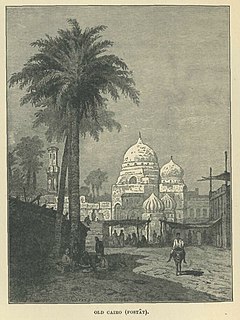 W
WThe Muslim conquest of Egypt by the Arabs took place between AD 639 and 646 and was overseen by the Rashidun Caliphate. It ended the centuries long period of Roman/Byzantine reign over Egypt. Byzantine rule in the country had been shaken, as Egypt had been conquered and occupied for a decade by the Sassanid Empire in 618–629, before being recovered by the Byzantine emperor Heraclius. The Caliphate took advantage of the Byzantines' exhaustion and captured Egypt ten years after its reconquest by Heraclius.
 W
WAmr ibn al-As al-Sahmi was the Arab commander who led the Muslim conquest of Egypt and served as its governor in 640–646 and 658–664. The son of a wealthy Qurayshite, Amr embraced Islam in c. 629 and was assigned important roles in the nascent Muslim community by the Islamic prophet Muhammad. The first caliph Abu Bakr appointed Amr as a commander of the conquest of Syria. He conquered most of Palestine, to which he was appointed governor, and led the Arabs to decisive victories over the Byzantines at the battles of Ajnadayn and Yarmouk in 634 and 636.
 W
WThe Babylon Fortress, a major military stronghold of the Byzantine Empire in Egypt, was captured by forces of the Rashidun Caliphate after a prolonged siege in 640. It was a major event during the Muslim conquest of Egypt.
 W
WFustat, also Fostat, Al Fustat, Misr al-Fustat and Fustat-Misr, was the first capital of Egypt under Muslim rule. It was built by the Muslim general 'Amr ibn al-'As immediately after the Muslim conquest of Egypt in AD 641, and featured the Mosque of Amr, the first mosque built in Egypt.
 W
WThe Battle of Heliopolis or Ayn Shams was a decisive battle between Arab Muslim armies and Byzantine forces for the control of Egypt. Though there were several major skirmishes after this battle, it effectively decided the fate of the Byzantine rule in Egypt, and opened the door for the Muslim conquest of the Byzantine Exarchate of Africa.
 W
WThe Mosque of Amr ibn al-As, or Taj al-Jawame', or Masjid Ahl ar-Rayah, or Jame’ al-Ateeq, was originally built in 641–642 AD, as the center of the newly founded capital of Egypt, Fustat. The original structure was the first mosque ever built in Egypt and the whole of Africa. For 600 years, the mosque was also an important center of Islamic learning until Al-Muizz's Al-Azhar Mosque in Islamic Cairo replaced it. Through the twentieth century, it was the fourth largest mosque in the Islamic world.
 W
WThe Battle of Nikiou was a battle between Arab Muslim troops under General Amr ibn al-A'as and the Byzantine Empire in Egypt in May of 646.
 W
WThe Rashidun Caliphate or the Rashidun Empire was the first of the four major caliphates established after the death of the Islamic prophet Muhammad. It was ruled by the first four successive caliphs (successors) of Muhammad after his death in 632 CE. These caliphs are collectively known in Sunni Islam as the Rashidun, or "Rightly Guided" caliphs.
 W
WForces of the Rashidun Caliphate seized the major Mediterranean port of Alexandria away from the Byzantine Empire in the middle of the 7th Century AD. Alexandria had been the capital of the Byzantine province of Egypt. This ended Eastern Roman maritime control and economic dominance of the Eastern Mediterranean and thus continued to shift geopolitical power further in favor of the Rashidun Caliphate.
 W
W`Ubadah ibn al-Samit was a companion of Muhammad and a well-respected chieftain of the Ansar tribes confederation, who participated in almost every battle during Muhammad's era. His official title, according to Muslim scholarly tradition, was Ubadah bin Saamit al-Ansari al-Badri for his actions at the Battle of Badr. He served under the first three Rashidun caliphs in the Muslim conquest against the Byzantines.
 W
WAz-Zubayr ibn Al-Awam was a cousin and companion of the Islamic prophet Muhammad and one of the first converts to Islam. He was also one of the ten companions whom Muhammad promised paradise. He became one of the political and military leaders of the community following the death of Muhammad. Az-Zubayr died in the Battle of the Camel.